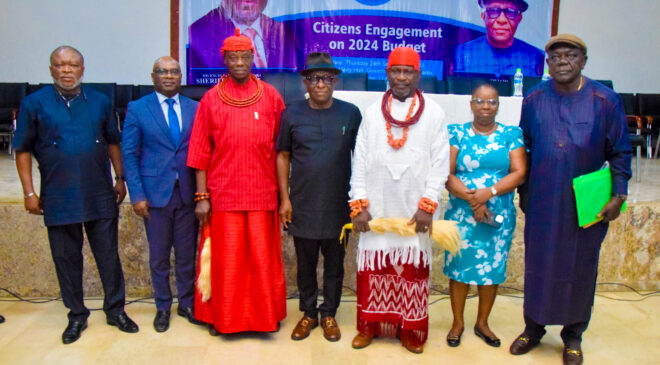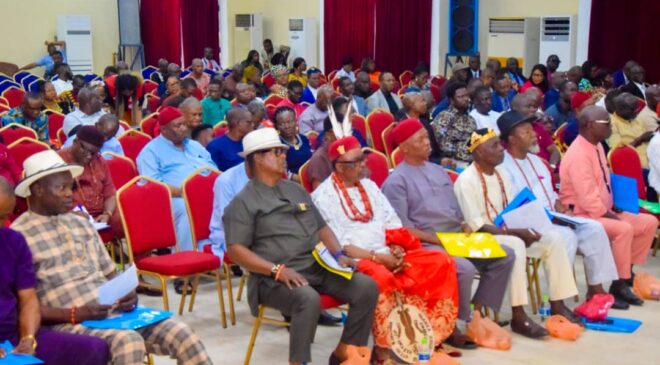By Emmanuel Enebeli
ASABA/Nigeria: Delta State government has revealed the roadmap for the upcoming fiscal year, placing a strong emphasis on fiscal responsibility and open governance principles.
The Commissioner of Economic Planning, Mr. Sonny Akporokiamo Ekedayen, disclosed this on September 28, 2023, in Asaba, the capital of Delta State during an engaging session on the 2024 Budget, which saw the participation of community leaders, civil society organizations (CSOs), and concerned citizens.
The objective of the session was to collaboratively deliberate on the preparatory phases and prerequisites for the 2024 budget formulation process. 
Commissioner of Economic Planning,Mr. Sonny Akporokiamo Ekedayen, Representatives of Traditional Rulers Council, Community Leaders and CSO’s
In his address, the Commissioner articulated the government’s conviction that citizen engagement would act as a catalyst for transparency and accountability in delivering essential services.
He stated, “We firmly believe that this approach will serve as a catalyst for transparency, accountability, and the efficient delivery of essential services to our esteemed citizens. We have convened here today with the conviction that participatory budgeting stands as the cornerstone of democratic decision-making, one that actively involves citizens in the allocation of public resources.”
He added, “Participatory budgeting, a pivotal pillar of this strategic roadmap, empowers citizens to propose and prioritize projects aligning with their unique needs and preferences. These suggestions undergo rigorous evaluation, with the most impactful ones earmarked for implementation. This methodology aspires to ensure that government resources are channeled in a manner that authentically mirrors the needs and priorities of the populace.”
He further underscored the indispensable role of CSOs and community leaders in governance, highlighting a steadfast commitment to strengthening their partnership. He recognized their instrumental role in representing marginalized and vulnerable demographics, ensuring their voices resonate throughout the governance processes.
The interactive session provided a platform for robust question-and-answer exchanges, affording citizens an invaluable opportunity to articulate concerns and focal points for the impending budgetary cycle.
The Commissioner also addressed the state’s fiscal landscape, offering insights into the amendments made to the 2023 budget. Originally sanctioned at N571.6 billion, a supplementary budget of N71.2 billion was introduced in May to address lingering priorities from the previous administration’s tenure. Economic realities and the discontinuation of food subsidies necessitated further adjustments, resulting in the approval of a revised budget totaling $809.3 billion by the House of Assembly.

He attributed the progressive expansion of the 2023 budget to marked improvements in revenue streams from internally generated revenue, statutory allocations, value-added tax, and the excess crude account all exhibited substantial gains, with internally generated revenue surpassing the budgeted amount by a remarkable 138 percent in the initial half of the year.
Shifting the spotlight to the 2024 budget, designed to align with the M.O.R.E. agenda, he stated that the government has identified three core focal areas of Environmental Sustainability, Human Capital Development, and Infrastructure Development.
The Commissioner expressed unwavering dedication to Delta State’s development, particularly in the realm of infrastructure expansion, with new towns and alternative energy sources poised for realization.
This strategic gathering drew participation from representatives of the State Traditional Council, CSOs, the President-General of Communities within the state, and other stakeholders.
At its conclusion, a unanimous consensus emerged with a resolute commitment to drive inclusive development that uplifts the living standards of the people, underpinned by a community-derived budgeting process.
